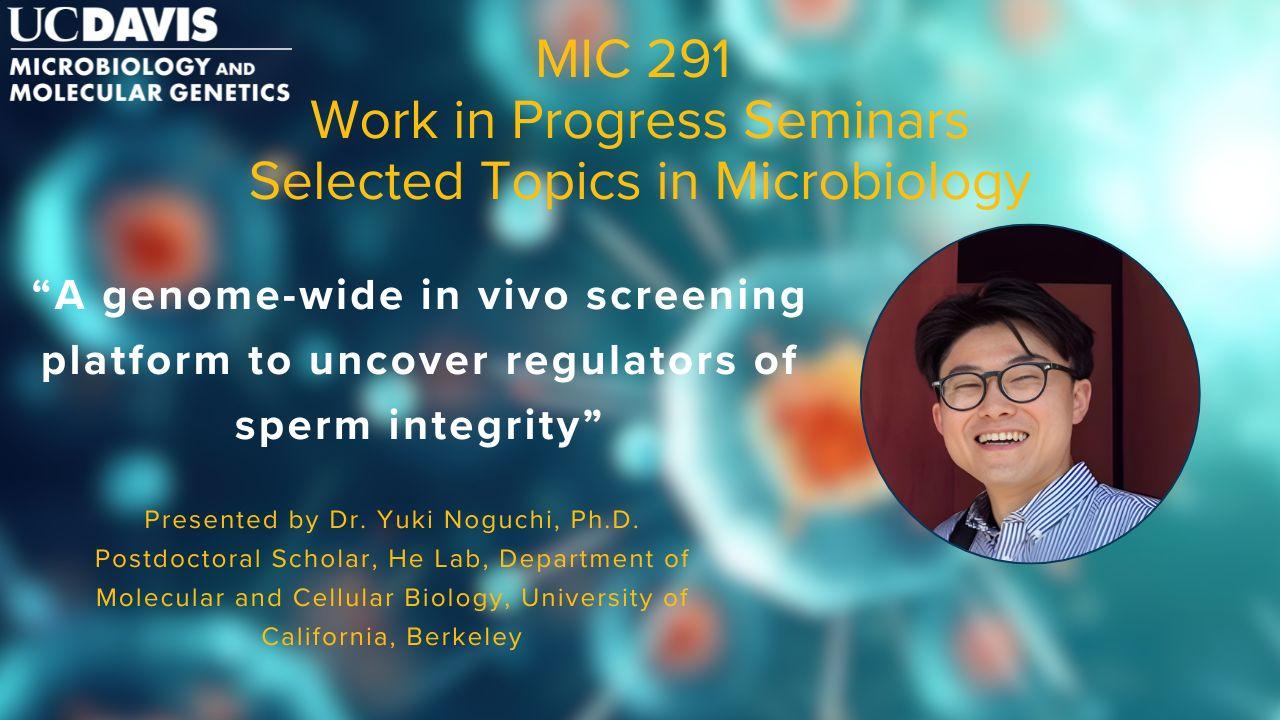
Event Date
MIC 291 Work in Progress Seminars
Selected Topics in Microbiology
- Dr. Yuki Noguchi, Postdoctoral Scholar, He Lab, Department of Molecular and Cellular Biology, University of California, Berkeley
- Dr. Noguchi presents: “A genome-wide in vivo screening platform to uncover regulators of sperm integrity"
In vivo CRISPR/sgRNA library screening is a powerful approach for systematically dissecting molecular mechanisms in living tissues or organs. Recent advances have enabled its application to various tissues, including the liver, brain, and heart, yielding significant biological insights. However, most in vivo screens rely on proliferation-based readouts, limiting their utility in studying biochemical mechanisms independent of cell growth. This is due to two main challenges: (1) uniformly inducing and assessing targeted biochemical reactions in non-dividing cells under inherently heterogeneous in vivo conditions; and (2) identifying and enriching functional sgRNAs independently of cell proliferation. This limitation is particularly pronounced for non-proliferative cell types such as sperm and oocytes, which are not amenable to long-term in vitro culture. As a result, functional studies in these contexts have largely relied on single-gene knockout mouse models.
To address these challenges, I developed a genome-wide in vivo testicular screening platform to systematically identify genes that regulate sperm integrity during spermatogenesis. This approach utilizes flow cytometry to functionally assess sperm capacitation, using Ca²⁺ influx as a readout, and isolates sperm exhibiting reduced Ca²⁺ influx. sgRNA sequences are then recovered from genomic DNA of the sorted sperm, allowing the library to be reconstituted for iterative screening. Through this process, I successfully pinpointed the retinal degeneration 3 (Rd3) gene as a significant factor in spermatogenesis.
In this seminar, I will provide a detailed overview of the three key innovations underlying this method: (1) A Sendai virus fusion protein-pseudotyped lentiviral system for male germ cell-specific delivery of sgRNA libraries; (2) A flow cytometry-based quantitative assay for assessing sperm capacitation via Ca²⁺ influx; and (3) a strategy to efficiently recover and reconstitute sgRNA libraries from sorted sperm. I will also discuss the potential of this platform to elucidate other physiological processes in spermatogenesis beyond sperm capacitation.
Please contact Satoshi Namekawa, snamekawa@ucdavis.edu or Amanda Huang amnhuang@ucdavis.edu for any questions.
